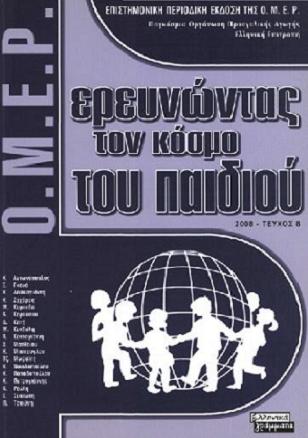The emergence of reading/writing abilities with reference to differentiated kindergarten literacy practices

Abstract
Our aim is to illustrate the significance of «meaningful» (i.e., play-like and communicative oriented) tasks in order to investigate some abilities (such as phonological awareness and graphophonemic correspondence) closely related to reading and writing practices. These tasks, implemented in two groups of 114 children with different school literacy background (i.e. traditional «coding-decoding» skills teaching vs emergent literacy practices), allowed us to see that reading and writing abilities do not differ significantly between the two groups. This could lead us to the assumption that, despite expectations, the exercising upon the «code» does not seem to be more appropriate strategy to promote reading/writing abilities compared with (the dynamics of) emergent literacy curriculum.
Article Details
- How to Cite
-
Συκιώτη (Eleni Sikioti) Ε., & Κονδύλη (Marianna Kondili) Μ. (2008). The emergence of reading/writing abilities with reference to differentiated kindergarten literacy practices. Investigating the child’s World, 8, 177–196. https://doi.org/10.12681/icw.18218
- Issue
- Vol. 8 (2008)
- Section
- Scientific articles & educational projects

This work is licensed under a Creative Commons Attribution-NonCommercial 4.0 International License.
Authors who publish with this journal agree to the following terms:
· Authors retain copyright and grant the journal right of first publication with the work simultaneously licensed under a Creative Commons Attribution Non-Commercial License that allows others to share the work with an acknowledgement of the work's authorship and initial publication in this journal.
· Authors are able to enter into separate, additional contractual arrangements for the non-exclusive distribution of the journal's published version of the work (e.g. post it to an institutional repository or publish it in a book), with an acknowledgement of its initial publication in this journal.
· Authors are permitted and encouraged to post their work online (preferably in institutional repositories or on their website) prior to and during the submission process, as it can lead to productive exchanges, as well as earlier and greater citation of published work.


